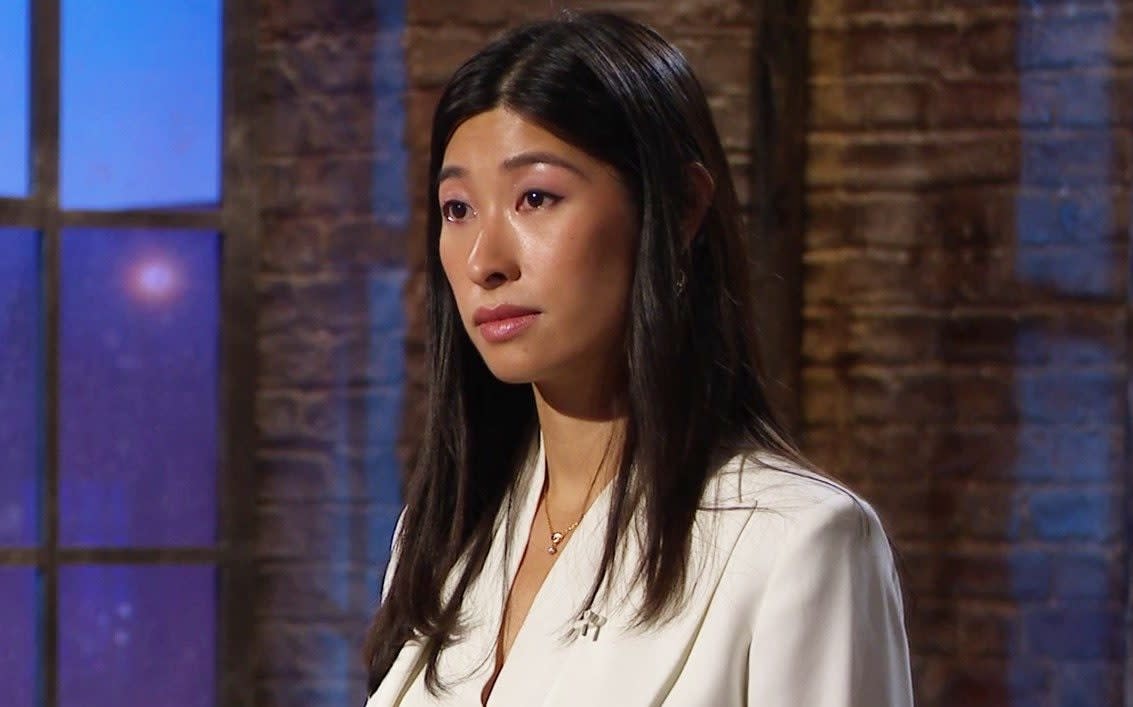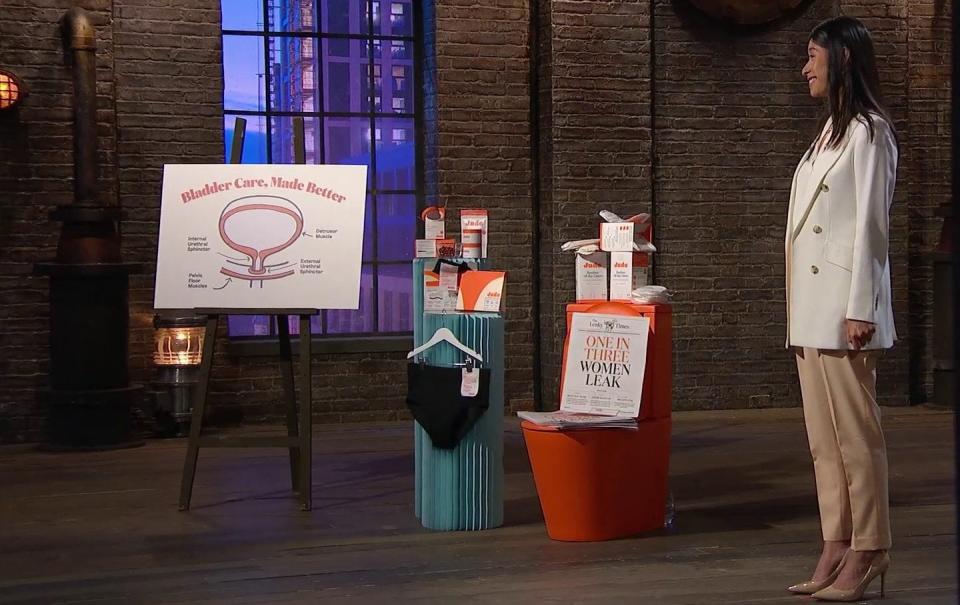Why I turned down £100,000 on Dragon’s Den for help in my taboo-busting business

Not many people turn the tables on the formidable moguls of Dragons’ Den. That’s why viewers were impressed when Peony Li said “I’m out”, turning down a £100,000 investment in her business when she appeared on the BBC show on Thursday night. Even more astonishing: it looks like her high-risk call has paid off.
Li has since revealed that her company Jude – which raises awareness around the taboo subject of bladder health and supplies products such as leak-proof pants and a bladder control supplement – is managing a £5 million annual turnover. Those products are selling out in retail spaces including Boots and QVC.
Eight months on from recording her Dragons’ Den episode, the company’s growth has quadrupled and its marketing costs have halved. That must be a huge relief to Li – and vindication for turning down the money.
Although £100,000 sounds like a lot, Peter Jones, Deborah Meaden and special guest Dragon Emma Grede (who co-founded the shapewear company Skims with the Kardashians) all wanted a hefty 3 per cent of the business in exchange – triple Li’s pitch of just 1 per cent.
However, Li had already arranged investment from others on better terms than the Dragons proposed, so, after they all refused her counter-bid of 1.5 per cent, she took a brave gamble in moving forward without them.
“If they’d accepted the offer or something remotely similar, I would have taken it in a heartbeat,” she admits. “I definitely had a bottom line. The company is not just my company. I also have investors who were there from day zero – I raised my first round of funding with no product, it was literally just an idea. So it was a difficult moment: I really wanted the Dragons to be part of the company, and I could see the potential of this exciting offer, but I had to honour and respect the people who believed in me when no one else did.”
Li adds that saying no struck a blow for gender inequality. “There is a bigger message here: women in boardrooms, especially when it comes to tough negotiations facing really impressive business people, are easily tempted and swayed to accept a lower offer. But I thought: what are my principles, what do I want to stand for as an entrepreneur? Is this is a sustainable long-term partnership, will it set me up for success?”
But how did Li build up such confidence – and build this hit company?
The future entrepreneur was born in Hong Kong and attended boarding school. Her passion for healthcare was instilled by her parents, whose company sells incontinence pads and liners.
However, Li didn’t plan to follow in their footsteps. Instead she moved alone to the UK aged 15, barely speaking any English. That experience allowed her to understand how it felt “to be unseen and unheard”, she’s since said. Now she takes pride in championing underserved communities.
Li clearly also has a phenomenal work ethic. She went on to study economics at the University of Cambridge, getting her Masters there, and then took a job at the Bank of America Merrill Lynch.
It wasn’t the right fit, but she was inspired by the start-up companies pitching their plans. “I knew I wanted to be on the other side of these deals,” she explained.
In 2019, Li became the head of operations at Daye, a company dedicated to gynaecological health and period care. There her achievements included helping to commercialise a pain-soothing tampon. During the pandemic, she also distributed six million pieces of protective equipment to front-line workers.
Endearingly, she teared up on Dragons’ Den while reflecting on how working in the healthcare sector has reconnected her with her parents and her roots. “I was very surprised when I cried. I’m quite a logical person,” she says. “But when they asked me about what drives me, and talked about my parents, I got so emotional. I had in my mind this picture of my mum and dad, both in their 60s, still running around, working, serving people with incontinence and contributing to women’s health. I now know how hard it is to run a business – when I was younger I had no idea why they were so busy. They’re Asian parents, they would never say they’re proud of me! But I know deep down they are. I’m carrying on the work they’re doing. Hopefully they won’t get too embarrassed when they see me cry!”

Her biggest success to date is definitely Jude, which she founded in 2022. The company’s most eye-catching product is its clinically proven supplements, made from all-natural ingredients like pumpkin seeds and soy phytoestrogen, and which, Jude claims, can strengthen your pelvic floor in just 12 weeks.
Li had the idea for the company when she realised how little was being done to tackle a widespread but little-discussed health issue: 14 million people are affected by bladder control issues in the UK, Jude claims, including one in three women. It particularly restricts the lives of older people.
Li spent thousands of hours speaking to sufferers and constantly hearing the word “embarrassed”. “It’s these people who I want to support,” she explained. “I want to play a part in improving their quality of life.”
“When I see a problem that needs to be solved, I need to start a conversation,” she once said; indeed, Li had this issue herself when she was 14 years old. “I got a UTI that lasted a decade. All the doctors deemed me too young to have incontinence, but I had that feeling of embarrassment and loss of control. When I put Jude out there next to Tena and Always, it makes sense. Women feel it’s high time we had a solution to our health, not just coping by putting a pad on it.”
For all those noble intentions, the Den was a great leveller. “There was some concern from the Dragons about how much we spend on marketing,” Li adds. “My response in the Den was that it’s not cheap breaking a taboo and a long-held stigma – it needs a lot of messaging and branding. But deep down I know we have to make the business efficient and profitable, so I took [on board] those valid, legitimate questions. I love the Dragons – I got lots of inspiration and really invaluable feedback from them. Deborah Meaden is so honest, she says it like it is, and I love Emma’s philosophy. It was a once-in-a-lifetime opportunity to pitch them my baby.”
It’s clear that Jude is more a mission than a business to her. However, many potential investors turned her down – some called her “wee lady” or “pad lady”, others told her bladder care simply wasn’t “sexy” enough.
But eventually her passionate pitch paid off. By April 2023, she had lined up £5.2 million of investment.
However, the big question remains following her appearance on Dragons’ Den – and it’s one Li asks followers on her Instagram last night. “Should I have taken the offer? What do you guys think?”
I’d argue Li got exactly what she needed from the Dragons, without giving away anything herself. Her mission all along has been to make bladder care a part of the mainstream conversation, empowering sufferers and helping them to take control of their healthcare. Now she’s brought Jude to the attention of millions of primetime BBC viewers, but has retained control of her company.
It might well turn out to be the Dragons who feel they let a lucrative opportunity slip away.

